Le Phare de Verzenay en Champagne
by
Terry Sullivan
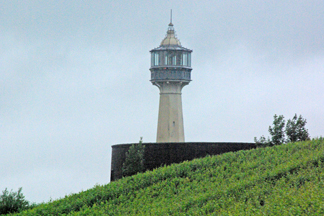 Summary: A lighthouse surrounded by vineyards may seem unusual, but for visitors to Verzenay, it is an ideal starting point for exploring Champagne.
Summary: A lighthouse surrounded by vineyards may seem unusual, but for visitors to Verzenay, it is an ideal starting point for exploring Champagne.
A lighthouse is usually associated with water. Rather than a traditional sea, the Lighthouse of Verzenay in Champagne overlooks a sea of vineyards. One hundred years ago the lighthouse was created by Joseph Goulet to promote his champagne. It became a meeting point between Reims and Epernay. The lighthouse suffered damage during World War I and eventually fell into disrepair.
In 1987, the lighthouse was given to the municipality of Verzenay by a champagne house that owned the property that it was on. In 1994, the Community of Vesle Montagne de Reims Municipalities decided to create a museum that was completed and opened to the public by 1999.
Vineyards
From the parking area there is a wood walkway to the museum. The walk is a stroll through vineyards. The town of Verzenay is surrounded by vineyards. In the distance, vineyards give way to a windmill that appears as a ship on the sea. During our early July visit, the grapes were at their cap stage with only a few flowering. In 2013 the vineyards were running two to three weeks behind average for this time of year. That will push harvest into the month of October. The vineyards are planted with Pinot Noir, Chardonnay and some Pinot Meunier.
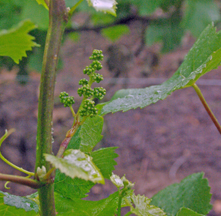
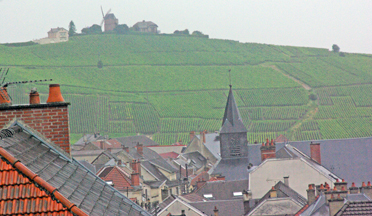
The Museum
After paying the admission fee, you pick up a headset that will explain the exhibits throughout the museum. The headsets worked well and the English speaking audio was easy to understand. The first stop was a theater where a video showed the vineyards in Verzenay. You will learn of the area of Verzenay including the plain, the hillside and the plateau. The plain is farmed, while the hillsides are covered in grapevines. The plateau is mostly forested.
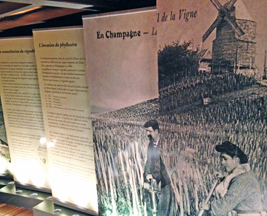 Throughout the museum, displays show photos and images of the town and surrounding area. The economy of Verzenay is based on viticulture. However, vineyard work did not always provide sufficient income, and many of the workers also worked in the forests in a variety of jobs involved with the harvest of wood. One museum room showed a timeline for this Champagne region. Several photos highlighted the challenges of phylloxera and the 1911 revolts against fraudulent wine flooding the area.
Throughout the museum, displays show photos and images of the town and surrounding area. The economy of Verzenay is based on viticulture. However, vineyard work did not always provide sufficient income, and many of the workers also worked in the forests in a variety of jobs involved with the harvest of wood. One museum room showed a timeline for this Champagne region. Several photos highlighted the challenges of phylloxera and the 1911 revolts against fraudulent wine flooding the area.
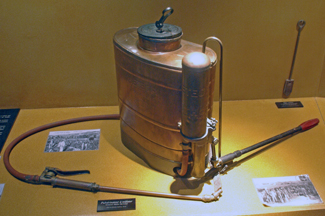 Other rooms highlighted the cycle of seasons, festivals and traditions. One room displayed tools used in the vineyards throughout the year. Smaller rooms had videos playing. The pace through the museum was easy-going. You can spend as much or as little time as you wish. After seeing the museum, you turn in your headsets and ascend the 102 steps to the top of the lighthouse.
Other rooms highlighted the cycle of seasons, festivals and traditions. One room displayed tools used in the vineyards throughout the year. Smaller rooms had videos playing. The pace through the museum was easy-going. You can spend as much or as little time as you wish. After seeing the museum, you turn in your headsets and ascend the 102 steps to the top of the lighthouse.
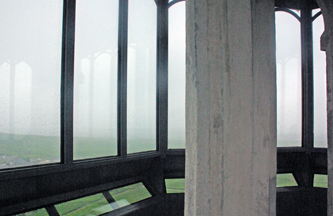 The Lighthouse
The Lighthouse
The spiral staircase becomes narrower as you climb higher. Once at the top, there is a fairly large area with windows that provides a 360º view of the landscape. This area of Champagne is truly a sea of green. On the day of our visit, our view was somewhat obstructed by the rain, a problem more for photography than viewing.
After climbing down, visit the small gift shop. The museum and lighthouse make a wonderful introduction to visiting the producers in Champagne. If possible, consider visiting Le Phare de Verzenay en Champagne first.
Le Phare de Verzenay en Champagne
51360 VERZENAY, France
0033 326 078 787
Visit these tour operators that partner with Wine Trail Traveler.
 |
||||
France
|
France
|
France | SmoothRed London, England, United Kingdom |


